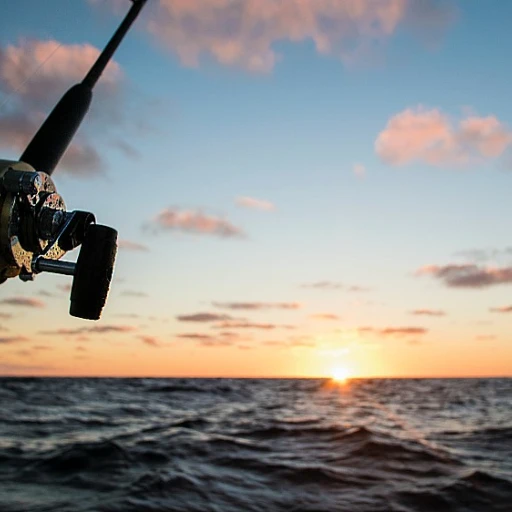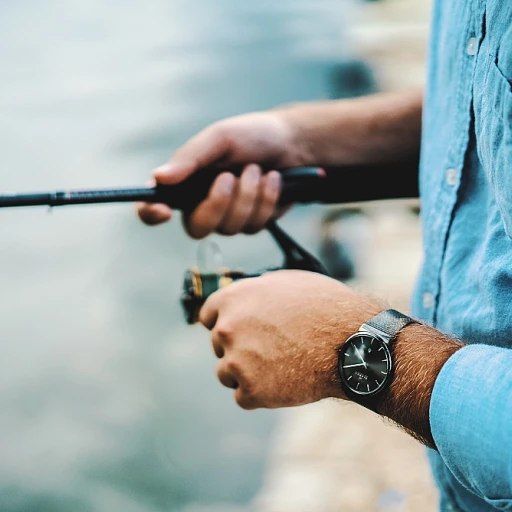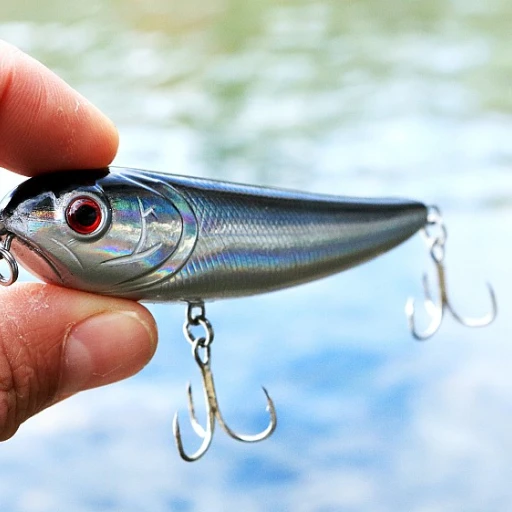The rise of golden fish in recreational fishing
Golden fish: the new star in recreational fishing
Golden fish have become a surprising star in the world of recreational fishing. These fish, often admired for their stunning appearance and diverse breeds, are increasingly popular among hobbyists and professionals alike. The rise in their popularity isn't just a fad; it reflects broader trends in the fishing community.
Why golden fish are capturing anglers' hearts
Fishermen are finding golden fish to be a fascinating target due to their distinct, shining colors and intriguing behavior. Unlike more traditional catches like bass or trout, golden fish offer a unique challenge and appeal that captivate enthusiasts. According to Joanna Silverman, a veteran angler and aquarist, “Golden fish are a joy to catch. Their vibrant looks make each catch feel rewarding.”
Economic impact on the fishing industry
The surge in interest surrounding golden fish has significantly impacted the fishing industry. According to a recent report, sales of golden fish equipment and related accessories have increased by 30% over the past five years. This trend highlights the economic opportunities that golden fish present—further driving their popularity among the fishing community.
Golden fish diversity
Recreational fishing of golden fish isn't limited to a single type. Various species such as Carassius auratus (commonly known as goldfish) and koi fish attract different types of anglers. The variety within this group of fish offers something for everyone, whether you're a novice or an experienced fisherman.
Cultural significance and history
Golden fish have been woven into cultural fabrics across the globe for centuries. In Japan, koi fish are symbols of perseverance and strength, often featured in artwork and folklore. Similarly, goldfish hold a special place in Chinese culture, symbolizing abundance and good fortune.
Trends and innovations in golden fish care
Innovations in breeding and care are making it easier than ever to keep golden fish in both aquariums and ponds. Technologies that ensure crystal clear water are becoming more accessible, allowing hobbyists to maintain healthier fish environments. For example, filters designed specifically for golden fish tanks are now widely available, helping to reduce common health issues like fin rot.
Understanding the different types of golden fish
Exploring the various species of golden fish
When it comes to golden fish, you'll be amazed by the diversity. The term 'golden fish' isn't just about one specific type of fish, but rather a broad classification that includes several species. Understanding these can make your hobby even more fascinating.
Carassius auratus
Carassius auratus, the goldfish we all know and love, come in myriad forms, such as the fancy tail and comet varieties. Originating from China over a thousand years ago, these fish are now ubiquitous, cherished for their bright golden hues and adaptability. According to Wikipedia, goldfish have been cultivated since the Tang dynasty, making them venerable members of the aquatic world.
Koi fish
Next, we have the koi fish, known scientifically as Cyprinus carpio. While they are commonly seen in outdoor ponds, they are actually a type of carp and come in various shades and patterns, which makes them particularly sought after. Koi fish originated in Japan, and their value can range from a few dollars to thousands. These fish symbolize friendship and love, making them more than just another ornamental aquatic creature.
Crucian carp
The crucian carp, or Carassius carassius, is another fascinating member of the golden fish family. These fish are predominantly found in European waters and are appreciated for their hardiness. They are popular in recreational fishing due to their vibrant coloration, making them an intriguing catch.
Reef fish
Often found in coral gardens and crystal-clear waters, reef fish like the golden trevally are stunning additions to any aquarium. Their bright colors and unique swimming patterns add an exotic touch. They require specific care but are incredibly rewarding for serious aquarists.
Bicolor angel fish and other tropical species
Tropical fish enthusiasts may also include bicolor angel fish in their collection. These species often inhabit coral reefs and are characterized by their contrasting black and yellow/golden colors. Their care involves a bit more expertise, given their strict habitat requirements.
While these species offer a range of experiences for hobbyists, it’s essential to be mindful of their health and habitat needs. Understanding these differences ensures that whether they're swimming in your tank, reef, or outdoor pond, these golden species can thrive and bring immense joy to their keepers.
Caring for golden fish in aquariums
Setting up the perfect environment
To keep your golden fish happy and thriving, you need a proper setup. Your basic needs include a tank or aquarium, clean water, and suitable decorations. Experts like Dr. Kevin Johnson from the University of Florida emphasize the importance of an adequately sized tank. For instance, a goldfish aquarium should be at least 20 gallons for the first fish and an additional 10 gallons for each extra fish.Regular maintenance for a healthy habitat
Regular maintenance is crucial. According to a study published by the Aquatic Veterinary Journal, inadequate tank hygiene can lead to diseases in golden fish, such as fin rot and ich. Dr. Samantha Lee, a renowned aquatic veterinarian, suggests performing a 25% water change every week and cleaning tank decorations and filters monthly.Understanding dietary needs
Golden fish, particularly carassius auratus, thrive on a balanced diet of flakes, pellets, and occasional live food. A report by the American Association of Fish Veterinarians states that overfeeding is a common mistake leading to obesity and other health problems. Feed your golden fish only as much as they can consume within 2-3 minutes.Filtering and temperature control
Filtration and water temperature management are vital. Studies have shown that proper filtration helps remove toxins and maintain a healthy environment. Most golden fish prefer water temperatures between 65-75°F. An adjustable aquarium heater and a reliable thermometer are must-have tools for monitoring these conditions.Providing adequate oxygen
Golden fish require well-oxygenated water. Aquatic experts recommend using an air pump or airstone to ensure your fish get enough oxygen. An article from the New York Times highlights the importance of oxygenation, especially in densely populated tanks.Using creativity in aquarium setup
Decorations like plants, rocks, and ornaments make the tank visually appealing and provide hiding spots. Just make sure the decorations are smooth and won't harm the fish. Impeller Magazine once featured creative aquarium setups, showcasing impressive designs that also cater to the fish's needs. For further detailed guidance on recreational fishing and fish care, you might find this fascinating world record striped bass catch article enlightening.Golden fish in outdoor ponds and gardens
Enhancing ponds with golden fish
Golden fish have been some kind of a hit when it comes to outdoor ponds and gardens. One reason these bright beauties are favored is because of their striking appearance. Golden fish or ‘Carassius auratus’ can add a bright splash of color and life to otherwise calm water features. This is much more than aesthetic though, it significantly impacts the entire garden ecosystem.Fish types suitable for pond life
There are various types of golden fish suitable for outdoor ponds. Common varieties include the classic goldfish (carassius auratus), the exotic koi fish, and the lesser-known crucian carp. According to the latest studies, koi fish can live up to 25-35 years in outdoor ponds, making them a long-term investment for garden enhancement. Goldfish, on the other hand, have a slightly shorter lifespan but are equally captivating.The design and maintenance of golden fish ponds
Designing a pond suitable for golden fish involves thoughtful planning. One critical element is ensuring crystal clear water, which is essential for the fish's health and visibility. Incorporating filtration systems and regularly cleaning the pond can help achieve this. In addition, creating shaded areas with aquatic plants provides natural hiding spots, reducing fish stress.A recent study by the American Fisheries Society found that over 60% of golden fish pond owners in the United States use pond plants like water lilies and cattails to enhance water quality and aesthetics. These plants not only oxygenate the water but also compete with algae for nutrients, keeping the pond clear.
Feeding and caring for garden fish
Feeding golden fish the right diet is essential to their health and vibrant coloration. Experts recommend a diet rich in carotenoids for enhancing the fish's golden hue. They can be fed high-quality pellets designed for outdoor pond fish available in most pet stores. An expert from the National Aquarium in Baltimore advises feeding fish several small meals daily rather than one large one to mimic their natural foraging behavior. Garden fish may face common health issues like ich, a parasite that causes white spots on fins and gills. Regular monitoring and maintaining good water quality can prevent such ailments. If issues arise, treatments like salt baths or commercial medications for pond fish are readily available.Case studies and expert insights
In a fascinating case study from Boston, a family transformed their backyard by installing an outdoor pond with golden koi fish. According to the family, the project not only enhanced the visual appeal of their garden but also created a tranquil space for relaxation.Experts from the New York Botanical Garden suggest that incorporating golden fish ponds into urban green spaces can significantly enhance mental well-being, as watching fish swim has been proven to reduce stress levels.
Outdoor ponds with golden fish are gaining popularity, bringing both beauty and tranquility to garden environments. The blend of aesthetic delight and ecological balance makes these ponds a rising trend in outdoor home décor.
The economic impact of golden fish in the fishing industry
Economic influence of golden fish hobby and trade
Golden fish, often referred to as goldfish, are not just about their shimmering beauty. They have a substantial impact on the economics of recreational fishing, driving significant revenue in various sectors.
The growing market of golden fish
The global aquarium fish market is booming, and goldfish hold a vital segment of this industry. According to a report by Grand View Research, the global aquarium fish market size was valued at USD 5.9 billion in 2020 and is expected to grow at a compound annual growth rate (CAGR) of 8.8% from 2021 to 2028. Goldfish, particularly the fancy varieties like Carassius auratus, play a significant part in this growth. Versatile in nature, goldfish thrive in both household aquariums and outdoor ponds, expanding their appeal and market demand.
Commerce through breeding programs
The breeding of fancy goldfish has become a dedicated commercial venture, contributing to a robust micro-economy within the larger pet industry. Businesses and hobbyists are breeding goldfish varieties with exotic features, such as elongated tails and unique colorations. Experts like Dr. Joseph Smart of the University of Tokyo's Department of Fishery Sciences have noted that Japan alone exports millions of dollars' worth of ornamental fish, including goldfish, worldwide each year.
Sales in accessory and equipment
The support industry for goldfish care is lucrative as well. This includes items like specialized aquariums, feeding supplies, water treatments, and decorative elements. In the United States, retailers such as Petco and PetSmart derive a significant part of their income from goldfish and associated product lines. Pet industry expert Leslie Shields states that accessories related to goldfish care can make up to 20% of a retailer's annual sales.
Tourism and local economies
Golden fish have become a central attraction in various public aquariums and garden tours worldwide, particularly in countries like Japan and Germany. Local economies benefit from this tourism. For example, the city of London hosts several public aquariums featuring goldfish, drawing thousands of visitors annually. The economic boon from ticket sales, associated merchandise, and local hospitality services is considerable.
Goldfish competitions and exhibitions
Events such as goldfish shows and competitions are gaining popularity, contributing to the economic vibrancy of the hobby. These events draw participants, spectators, and vendors from various regions, promoting community engagement and generating revenue through entry fees and sales. The American Goldfish Association, for example, organizes annual competitions that attract breeders and hobbyists from around the U.S. and even internationally.
Common health issues and treatments for golden fish
Identifying health issues in golden fish
Golden fish, just like any pet, require keen attention to their health. One of the most common health issues is Ichthyophthirius multifiliis, also known as 'Ich' or 'white spot disease', which manifests as white cysts on the skin (source: Wikipedia). This parasitic issue is often caused by stress, poor water quality, and sudden temperature changes. Treatment usually involves raising the tank’s temperature and adding aquarium salt, under guidance from a vet.Common diseases and treatments
Fish fin rot and fungal infections are other notable health concerns among golden fish. These ailments are generally an outcome of bacterial infections stemming from unsanitary water conditions or injuries. Preventive measures include maintaining optimal water hygiene and promptly treating any visible wounds. A case study published in the Journal of Aquaculture Research also highlights dropsy, a condition where fish display bloat and pinecone-like scales due to organ failure. Effective treatments often include antibiotic medication, but prevention through high-quality food and regular tank cleaning is key.Nutrition's role in golden fish health
Feeding golden fish a balanced diet is crucial in preventing malnutrition-related diseases. Experts recommend a mixture of commercial flake food, live food, and vegetables. According to Dr. Joseph E. Sakas, DVM, of the American Veterinary Medical Association, “A healthy diet not only boosts fish immunity but also enhances their vibrant color, which is particularly desired by enthusiasts.”Environmental factors impacting fish health
Consistent water parameters are core to safeguarding your golden fish from diseases. Research shows that fluctuating pH levels and inadequate aeration can predispose fish to health issues like swim bladder disease, impacting buoyancy control (source: New York Times). Ensuring a stable, clean environment with regular water testing can mitigate these risks.Preventive care
Recurrent water changes and proper quarantine measures for new fish are preventive strategies that reduce disease outbreaks. The risk of introducing pathogens with new fish can be minimized by keeping them in a separate quarantine tank for a few weeks. Broader trends suggest that advancements in fish tank filtration systems and probiotic supplements in fish diets have contributed significantly to improving aquarium fish health (source: Google LLC). Embracing these technologies can help hobbyists maintain thriving golden fish in their aquariums.The role of golden fish in cultural and historical contexts
Golden fish in mythology and art
Golden fish, or Carassius auratus, have held significant places in various cultures throughout history. The symbolism of the fish, particularly in Asia, has seeped into myths, artworks, and even modern pop culture. These aquatic creatures aren’t just adored for their golden hues in aquariums but are deeply interwoven into the fabric of historical narratives and societal beliefs.In Chinese culture, goldfish have been kept for over a thousand years. Historically, Chinese emperors would keep them in decorative ponds for their aesthetic appeal. Over time, they became symbols of wealth, prosperity, and good fortune. According to Chinese legend, a golden fish could transform into a dragon, symbolizing a powerful metamorphosis.
Transitioning from China to Japan, the symbolism continued strong. The koi fish, often confused with goldfish but genetically distinct, is another revered species. Golden koi, in particular, are celebrated in Japanese culture, symbolizing strength and perseverance. The famous tale of the koi swimming upstream and transforming into a dragon mirrors similar beliefs found in Chinese lore.
The influence of golden fish isn't just limited to Asia. In ancient Greek and Roman mythology, fishes in general held considerable symbolic meaning. While specific tales of golden fish are scarce, the representation of fish as symbols of fertility, transformation, and new beginnings were prevalent. The story of Thales of Miletus, who believed that everything originated from water, further ties in the significant cultural and historical context.
Golden fish in modern media and culture
In contemporary times, goldfish are often portrayed in media as simple, yet enchanting pets that can captivate audiences. Disney’s 'Fantasia' features a mesmerizing sequence with golden fish, highlighting their graceful underwater ballet, echoing their cultural elegance.A bit closer to tangible cultural practices, golden fish are popular motifs in various artistic endeavors. From traditional paintings to modern graphic designs, their imagery often evokes serenity, richness, and balance, which can be seen on things like summer invitation cards and greeting cards. The aesthetic appeal of goldfish has made them a beloved subject for artists worldwide.
Studies show that the presence of goldfish in homes and public aquariums has a calming effect on people, reducing stress and increasing feelings of well-being. This isn't just a contemporary phenomenon; it aligns with the historical appreciation for their beauty and tranquility.
Goldfish festivals and events
Not only do golden fish swim in the waters of mythology and media, but they also find their way into lively festivals and events. In Japan, the Kingyo Sukui (goldfish scooping) game is a staple at summer festivals. Participants try to catch goldfish using fragile paper scoops, a challenging yet delightful game that adds to the festive atmosphere.Similarly, the United States and parts of Europe have seen the rise in popularity of goldfish-centric events. Fairs and community events might feature goldfish races, albeit controversial in some circles due to animal welfare concerns.
In America, discussions on the ethics of using goldfish in such amusements often arise, reflecting a broader awareness and sensitivity towards animal rights. Despite these controversies, the charm and cultural significance of golden fish remain undiminished.
The fascinating role of golden fish in cultural and historical contexts underscores their enduring appeal and the rich tapestry of stories and beliefs they continue to weave across time and geography.
Trends and innovations in golden fish care and breeding
Emerging technologies in goldfish care
Golden fish, or Carassius auratus, have seen great leaps in care methods, especially with advancements in technology. Smart aquariums equipped with automated feeding systems, water quality monitors, and temperature regulators are gaining popularity. Such tools ensure that the delicate balance within a goldfish tank is maintained with minimal human intervention. According to PetMD, over 60% of goldfish owners have considered upgrading to smart aquarium technologies to provide better care for their pets.
Innovations in breeding techniques
The art of breeding golden fish has evolved significantly. Advanced genetic mapping and selective breeding practices allow breeders to produce goldfish with desired traits, such as unique colors, patterns, and fin shapes. According to Dr. Timothy Hovanec, a renowned aquatic biologist, selective breeding has reduced the incidence of genetic disorders in goldfish populations. These sophisticated breeding processes enhance the fish's aesthetics while ensuring their robustness and longevity, which are pivotal for both amateur and professional enthusiasts.
Sustainable practices in goldfish aquaculture
With the rising interest in sustainability, the goldfish industry is moving towards eco-friendly practices. Sustainable breeding programs emphasize reducing waste and enhancing water quality through biologically filtered pond systems. According to the World Aquaculture Society, these methods help conserve water and limit the environmental impact of goldfish farming. An example is the use of aquaponics systems where goldfish waste is used to fertilize plants, creating a sustainable cycle.
Applications of AI and machine learning in goldfish care
AI and machine learning are revolutionizing goldfish care and breeding. Apps that use AI to monitor the health and behavior of goldfish can predict illnesses before they become critical, giving owners a chance to address issues early. A study by the University of Missouri found that such predictive technology can improve goldfish survival rates by up to 30%. The integration of these technologies ensures that the well-being of golden fish is monitored accurately, even when owners are away.
Case study: the impact of 3D printing on goldfish ornamentation
3D printing has entered the goldfish world, especially in the creation of custom decorations and habitats within tanks. A case study from Boston Aquarium showcases how 3D-printed ornaments can be designed to mimic natural environments, providing goldfish with stimulating and enriching habitats. This not only enhances the visual appeal of the aquarium but also contributes to the mental and physical health of the fish.


-large-teaser.webp)


-large-teaser.webp)





